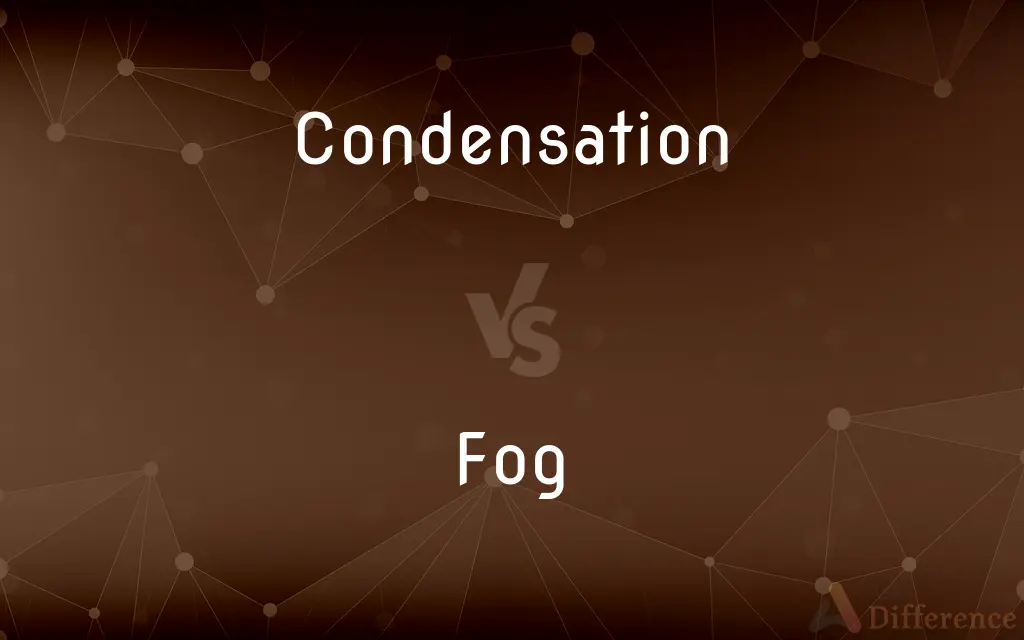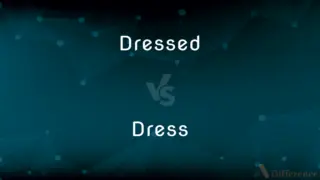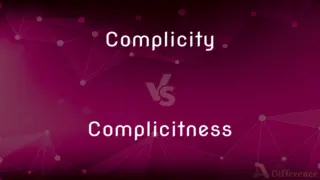Condensation vs. Fog — What's the Difference?

Difference Between Condensation and Fog
ADVERTISEMENT
Compare with Definitions
Condensation
Condensation is the change of the physical state of matter from the gas phase into the liquid phase, and is the reverse of vaporization. The word most often refers to the water cycle.
Fog
Fog is a visible aerosol consisting of tiny water droplets or ice crystals suspended in the air at or near the Earth's surface. Fog can be considered a type of low-lying cloud usually resembling stratus, and is heavily influenced by nearby bodies of water, topography, and wind conditions.
Condensation
Water which collects as droplets on a cold surface when humid air is in contact with it
The inside of the cab steamed up with condensation
Fog
A thick cloud of tiny water droplets suspended in the atmosphere at or near the earth's surface which obscures or restricts visibility (to a greater extent than mist; strictly, reducing visibility to below 1 km)
The collision occurred in thick fog
Condensation
The conversion of a vapour or gas to a liquid
The cloud is caused by condensation in the air
ADVERTISEMENT
Fog
A state or cause of perplexity or confusion
The coffee helped clear the fog in my brain
Condensation
A concise version of something, especially a text
A readable condensation of the recent literature
Fog
The grass which grows in a field after a crop of hay has been taken.
Condensation
The act of condensing.
Fog
(with reference to a glass surface) cover or become covered with steam
The windscreen was starting to fog up
Hot steam drifted about her, fogging up the window
Condensation
The state of being condensed.
Fog
Bewilder or puzzle
She stared at him, confusion fogging her brain
Condensation
An abridgment or shortening of something, especially of a written work or speech.
Fog
Spray with an insecticide.
Condensation
The process by which a gas or vapor changes to a liquid.
Fog
Condensed water vapor in cloudlike masses lying close to the ground and limiting visibility.
Condensation
The liquid so formed.
Fog
An obscuring haze, as of atmospheric dust or smoke.
Condensation
(Chemistry) A chemical reaction in which water or another simple substance is released by the combination of two or more molecules.
Fog
A mist or film clouding a surface, as of a window, lens, or mirror.
Condensation
(Psychology) In psychoanalytic theory, the process by which a single symbol or word is associated with the emotional content of several, not necessarily related, ideas, feelings, memories, or impulses, especially as expressed in dreams.
Fog
A cloud of vaporized liquid, especially a chemical spray used in fighting fires.
Condensation
The act or process of condensing or of being condensed
Fog
A state of mental vagueness or bewilderment.
Condensation
The state of being condensed.
Fog
Something that obscures or conceals; a haze
Shrouded their actions in a fog of disinformation.
Condensation
(physics) The conversion of a gas to a liquid.
Fog
A blur on a developed photographic image.
Condensation
The condensate so formed.
Fog
A new growth of grass appearing on a field that has been mowed or grazed.
Condensation
(chemistry) The reaction of two substances with the simultaneous loss of water or other small molecule.
Dehydration synthesis
Fog
Tall, coarse grass left standing in fields through the winter.
Condensation
(psychology) when a single idea (an image, memory, or thought) or dream object stands for several associations and ideas.
Fog
To cover or envelop with fog.
Condensation
The act or process of condensing or of being condensed; the state of being condensed.
He [Goldsmith] was a great and perhaps an unequaled master of the arts of selection and condensation.
Fog
To cause to be obscured; cloud.
Condensation
The act or process of reducing, by depression of temperature or increase of pressure, etc., to another and denser form, as gas to the condition of a liquid or steam to water.
Fog
To make vague, hazy, or confused
A memory that had been fogged by time.
Condensation
A rearrangement or concentration of the different constituents of one or more substances into a distinct and definite compound of greater complexity and molecular weight, often resulting in an increase of density, as the condensation of oxygen into ozone, or of acetone into mesitylene.
Fog
To obscure or dim (a photographic image).
Condensation
(psychoanalysis) an unconscious process whereby two ideas or images combine into a single symbol; especially in dreams
Fog
To be covered with fog.
Condensation
The process of changing from a gaseous to a liquid or solid state
Fog
To be blurred, clouded, or obscured
My glasses fogged in the warm air.
Condensation
Atmospheric moisture that has condensed because of cold
Fog
To be dimmed or obscured. Used of a photographic image.
Condensation
The process or result of becoming smaller or pressed together;
The contraction of a gas on cooling
Fog
(uncountable) A thick cloud that forms near the ground; the obscurity of such a cloud. mist, haze.}}
A bank of fog
Condensation
A shortened version of a written work
Fog
(uncountable) A mist or film clouding a surface.
Condensation
The act of increasing the density of something
Fog
A state of mind characterized by lethargy and confusion.
He did so many drugs, he was still in a fog three months after going through detox.
Fog
(photography) A silver deposit or other blur on a negative or developed photographic image.
Fog
(computer graphics) Distance fog.
Fog
A new growth of grass appearing on a field that has been mowed or grazed.
Fog
Tall and decaying grass left standing after the cutting or grazing season.
Fog
(Scotland) Moss.
Fog
(intransitive) To become covered with or as if with fog.
Fog
(intransitive) To become obscured in condensation or water.
The mirror fogged every time he showered.
Fog
To become dim or obscure.
Fog
To make dim or obscure.
Fog
To spoil (film) via exposure to light other than in the normal process of taking a photograph.
Fog
(transitive) To cover with or as if with fog.
Fog
(transitive) To disperse insecticide into (a forest canopy) so as to collect organisms.
Fog
(transitive) To obscure in condensation or water.
Fog
(transitive) To make confusing or obscure.
Fog
To practice in a small or mean way; to pettifog.
Fog
(transitive) To pasture cattle on the fog (of), or aftergrass, of; to eat off the fog from (a field).
Fog
(intransitive) To become covered with the kind of grass called fog.
Fog
A second growth of grass; aftergrass.
Fog
Watery vapor condensed in the lower part of the atmosphere and disturbing its transparency. It differs from cloud only in being near the ground, and from mist in not approaching so nearly to fine rain. See Cloud.
Fog
A state of mental confusion.
Fog
Cloudiness or partial opacity of those parts of a developed film or a photograph which should be clear.
Fog
To pasture cattle on the fog, or aftergrass, of; to eat off the fog from.
Fog
To practice in a small or mean way; to pettifog.
Where wouldst thou fog to get a fee?
Fog
To envelop, as with fog; to befog; to overcast; to darken; to obscure.
Fog
To render semiopaque or cloudy, as a negative film, by exposure to stray light, too long an exposure to the developer, etc.
Fog
To show indistinctly or become indistinct, as the picture on a negative sometimes does in the process of development.
Fog
Droplets of water vapor suspended in the air near the ground
Fog
An atmosphere in which visibility is reduced because of a cloud of some substance
Fog
Confusion characterized by lack of clarity
Fog
Make less visible or unclear;
The stars are obscured by the clouds
Share Your Discovery

Previous Comparison
Dressed vs. Dress
Next Comparison
Complicity vs. Complicitness













































